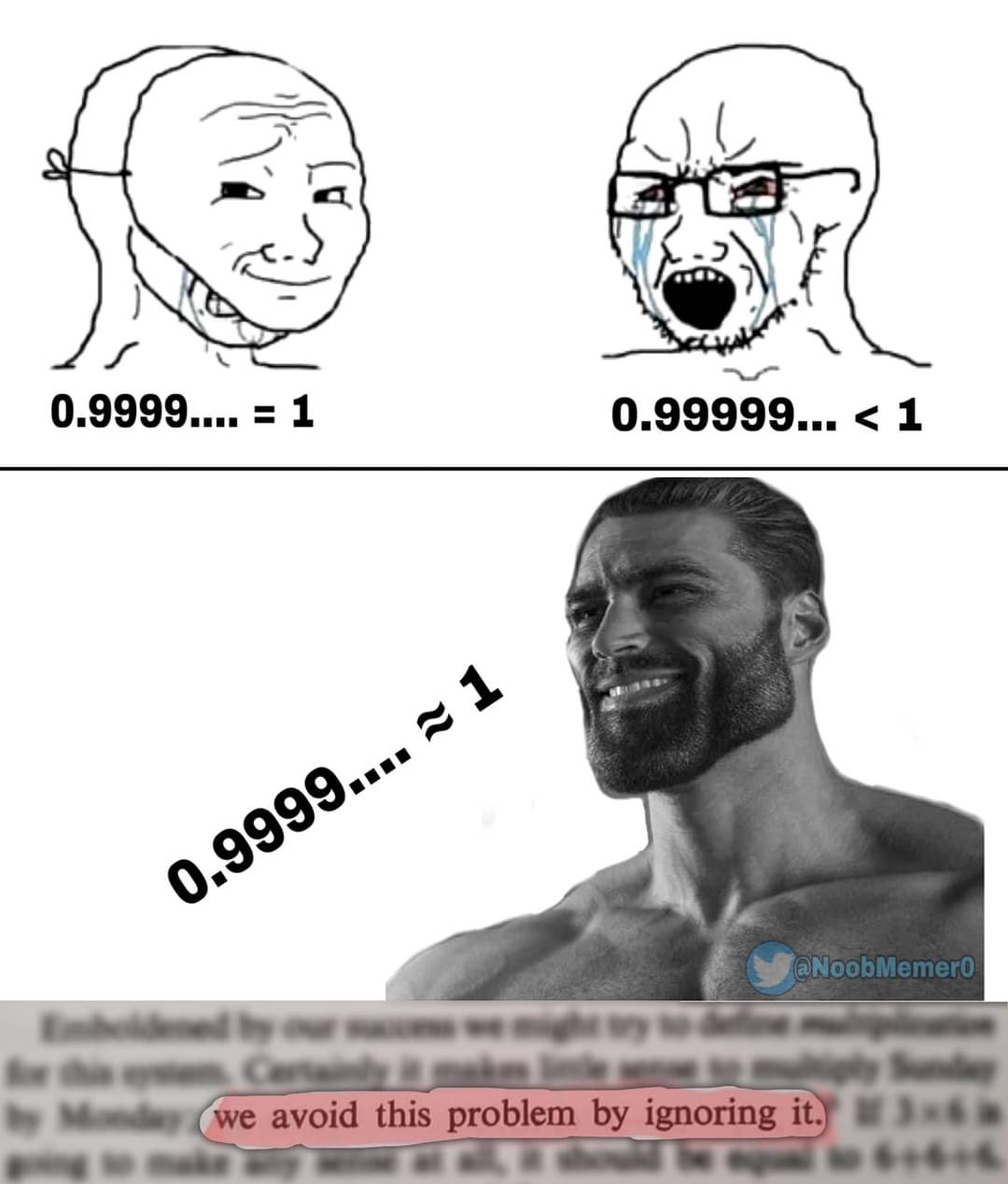this post was submitted on 27 Jun 2024
792 points (95.1% liked)
Science Memes
10940 readers
1783 users here now
Welcome to c/science_memes @ Mander.xyz!
A place for majestic STEMLORD peacocking, as well as memes about the realities of working in a lab.

Rules
- Don't throw mud. Behave like an intellectual and remember the human.
- Keep it rooted (on topic).
- No spam.
- Infographics welcome, get schooled.
This is a science community. We use the Dawkins definition of meme.
Research Committee
Other Mander Communities
Science and Research
Biology and Life Sciences
- !abiogenesis@mander.xyz
- !animal-behavior@mander.xyz
- !anthropology@mander.xyz
- !arachnology@mander.xyz
- !balconygardening@slrpnk.net
- !biodiversity@mander.xyz
- !biology@mander.xyz
- !biophysics@mander.xyz
- !botany@mander.xyz
- !ecology@mander.xyz
- !entomology@mander.xyz
- !fermentation@mander.xyz
- !herpetology@mander.xyz
- !houseplants@mander.xyz
- !medicine@mander.xyz
- !microscopy@mander.xyz
- !mycology@mander.xyz
- !nudibranchs@mander.xyz
- !nutrition@mander.xyz
- !palaeoecology@mander.xyz
- !palaeontology@mander.xyz
- !photosynthesis@mander.xyz
- !plantid@mander.xyz
- !plants@mander.xyz
- !reptiles and amphibians@mander.xyz
Physical Sciences
- !astronomy@mander.xyz
- !chemistry@mander.xyz
- !earthscience@mander.xyz
- !geography@mander.xyz
- !geospatial@mander.xyz
- !nuclear@mander.xyz
- !physics@mander.xyz
- !quantum-computing@mander.xyz
- !spectroscopy@mander.xyz
Humanities and Social Sciences
Practical and Applied Sciences
- !exercise-and sports-science@mander.xyz
- !gardening@mander.xyz
- !self sufficiency@mander.xyz
- !soilscience@slrpnk.net
- !terrariums@mander.xyz
- !timelapse@mander.xyz
Memes
Miscellaneous
founded 2 years ago
MODERATORS
you are viewing a single comment's thread
view the rest of the comments
view the rest of the comments

According to me, talking about the origin of the 0.999... issue of the original comment, the "conversion of fractions to decimals", or using basic arithmetic to manipulate values into repeating decimals. This has been my position the entire time. If this was about the limits of accuracy, then it would be impossible to solve the 0.999... = 1 issue. Yet it is possible, our accuracy isn't limited in this fashion.
Because that's where the entire 0.999... = 1 originates. You'll never even see 0.999... without using basic addition on each digit individually, especially if you use fractions the entire time. Thus 0.999... is an artifact of basic arithmetic, a flaw of that system.
Then you agree that not every system is applicable everywhere! Even if you use that system perfectly, you'll still end up with the wrong answer! Thus the issue isn't someone using the system incorrectly, it's a limitation of the system that they used. The correct response to this isn't throwing heaps of other systems at the person, it's communicating the limit of that system.
If someone is trying to hammer a screw, chastising them for their swinging technique then using your personal impact wrench in front of them isn't going to help. They're just going to hit you with the hammer, and continue using the tools they have. Explaining that a hammer can't do the twisting motion needed for screws, then handing them a screwdriver will get you both much farther.
It never was, and neither is the problem we've been discussing. You can talk about glue, staples, clamps, rivets, and bolts as much as you like, people with hammers are still going to hit screws.
Right. So not according to the meme, which doesn't tell us where the 0.999... comes from. Nor the 1 - could be an integer, floating point, or an estimation. Thanks for playing.